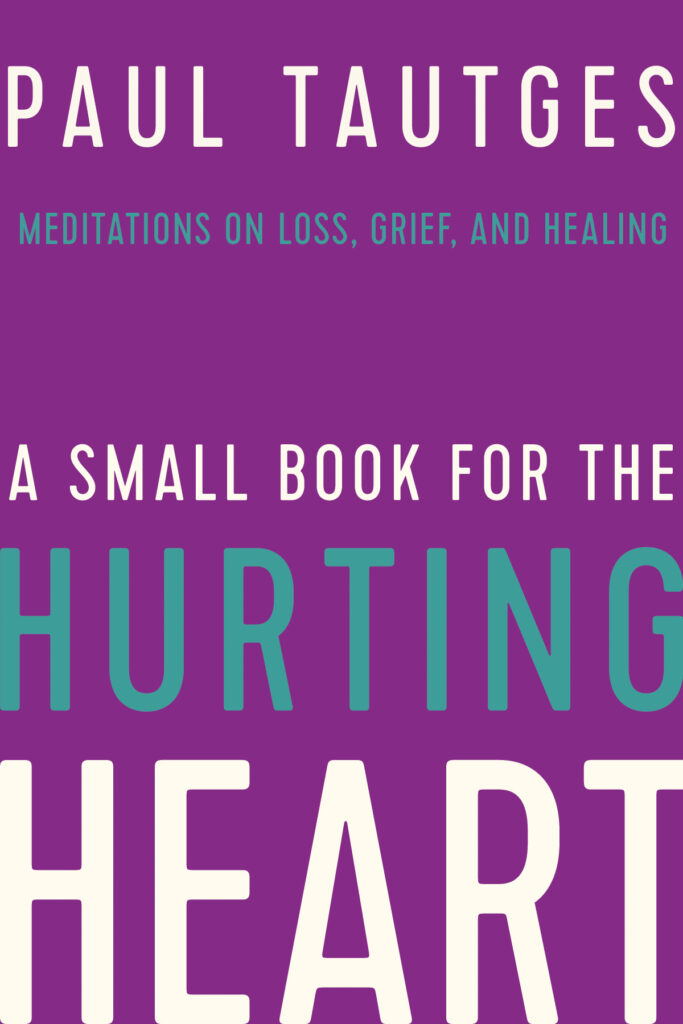In A Small Book for the Hurting Heart: Meditations on Loss, Grief, and Healing, Paul Tautges offers fifty short devotions filled with messages of help, encouragement, and healing. By biblically and transparently addressing the heart and faith struggles in the midst of this grief, Tautges delves deeply, but gently, into the issues of the heart—presenting encouragement and comfort in the character of God.
This small but transformative devotional cultivates anchors of hope, redirecting men and women to the trustworthiness of God who is always for them in Christ. Tautges walks with readers through their grief to see the one who nourishes their faith and heals their soul.
Paul shares more about the book, directly from his heart, in this interview with our team.
Q: Can you tell us about the format of A Small Book for the Hurting Heart and how it is intended to be used? Who will benefit most from your devotional?
A Small Book for the Hurting Heart is a collection of 50 brief meditations drawn from small portions of Scripture which apply God’s hope and healing to our hearts and minds in the midst of life’s losses. Second Corinthians 1:3–4 says that God comforts us, not only to meet our deepest needs by applying his healing balm to our hurts, but in order that we may be equipped to be a conduit of grace to others. Ultimately, I wrote this book to come alongside hurting people and direct them heavenward.
The pain that accompanies loss does not subside quickly or easily. Therefore, the book is intended to be read slowly, one meditation a day, with thoughtfulness and a prayerful spirit. Each meditation ends with a suggested way to apply scriptural truth. Some readers may want to keep a journal for the purpose of interacting with these truths and responding to the applications. Most likely it will primarily be used personally, individually, but I would also love to see it read with a friend, or in a larger setting, perhaps a grief support group. This book is for anyone who is experiencing the grief that accompanies any kind of loss.
Q: When we think about grief, we first think about the loss of a loved one? What other types of grief and loss do you speak to in the book?
Mankind’s original sin in the garden impacted every area of human life. Therefore, nothing and no one remains untouched by our fallenness. When Adam and Eve chose to go their own way—away from the goodness of God’s design and the peacefulness of walking in his presence—the door was opened to an untold number of traumatic experiences and griefs. As a result, our losses come in many, many forms.
Of course, there’s loss through the death of a spouse, child, or other loved one. But there’s also the loss of relationships through conflict, betrayal, estrangement, divorce, or a move across the country; loss of financial security due to business failure, foreclosure, or long-term unemployment; loss of innocence and dignity through abuse, loss of health or personal dreams because of disability or terminal illness. And the list goes on and on. Though the specific circumstances of our griefs are as unique as each of us, what remains the same is the inner pain we experience and the need to apply God’s gracious promises to each one of them.
Q: You’ve served not only as a pastor and counselor, but as a hospice chaplain. Does the weight of the grief of those around you ever become overwhelming?
Yes, bringing God’s comfort to those who are hurting can become overwhelming. So, personally, I have to consciously remind myself that, though I am one of the means that God uses to spread comfort to others, I’m not the ultimate comforter. God is our tender and faithful Father, Jesus is the Good Shepherd, and the Holy Spirit is the comforter whom Jesus sent. The Spirit is also the divine author of Scripture, which indicates one of the chief ways that the comfort of God is brought to our hearts; that is, through Scripture.
God’s Word has the power to heal. It applies grace to our deepest hurts, since it is the voice of the one who created us and redeems us through Christ. This is key to not becoming swallowed up by grief—my own or that of others. Our role as comforters is to faithfully come alongside others in order to walk through their valley of loss with them, but God is ultimately the healer of their hurts.
Q: Grief has struck your own family in a deep way recently. Would you mind sharing about your own grief journey?
Only God knew that between the time that I first submitted the manuscript for this book and today, our family would experience significant loss. Two losses we felt most acutely were the deaths of a loving, godly father, and our infant granddaughter who lived for only 45 minutes outside of her mother’s womb. Both of those losses took the wind out of our sails for a time. But in the valley of sorrow, we anchored our faith to three stabilizing truths drawn from three portions of Scripture.
First, God ordains the length of each person’s life, even before they are born (Psalm 139:16). Second, death is a defeated enemy (1 Corinthians 15:54–55). Third, grief hurts, but God’s comfort is real. Indeed, he is the God of all comfort who comforts us in any affliction (2 Corinthians 1:3–4). Knowing and embracing these truths does not eliminate all of the pain but applies God’s healing grace while reminding us to look forward to the day when God will wipe away every tear and make all things new (Revelation 21:4–5).
Q: In your book you relentlessly connect God’s comfort to the gospel. Why is that?
In times of loss we desperately need to know that God is near. Nothing meets this need quite like the gospel; that is, the good news about how God drew near to us by sending his only Son to conquer sin, death, and the devil on our behalf. The gospel offers us an everlasting hope which enables us to face the reality of death and other forms of loss head-on. When we gently speak these hope-dispensing truths to ourselves and others, we make loss a servant to God’s purposes by redirecting our focus to matters of eternity.
The strength of God’s comfort does not come from his ability to change our present circumstances (which he can do if he chooses). Rather, God’s comfort comes from his promise to us in Christ, that the glory we will one day share with him far outweighs our present suffering (Philippians 1:6; Romans 8:18). Christ-centered comfort is the only true comfort.
Q: Psalm 56:8 tells us that God keeps track of our sorrows and collects our tears. Why are our tears that important to God?
Tears are a gift from God, a means to embracing your pain, releasing emotion, and revealing the depth of your love. Poetically, if God collects all the tears we cry during our life’s journey, if he keeps track of all our sorrows, then surely, he cares about them. He is aware of what causes them. Like it did for King David, this truth encourages us to turn toward God and plead for his sustaining grace.
When something bad happens, we may be tempted to think of God as being distant or even against us. But if we belong to him, through repentant faith in Jesus as our Lord and Savior, there is nothing that can ever separate us from his love: not heartbreak, not distress, not disability, not death, not loss of any kind, nothing (Romans 8:38–39)! He is intimately aware of all of our struggles, and longs to show us the depth of his fatherly love.
Q: In the Sermon on the Mount, Jesus preaches that blessed are those who mourn. In what ways are we blessed in times of great grief?
Loss has a way of nudging us to look to the Lord, which is a hidden blessing. Typically, however, when grievous things happen, our first reaction is to turn inward instead of upward, to look inside for the strength we need to endure. But, if we’re honest, we are actually really weak people. And that’s ok. It’s actually by God’s design. I like to say that we are dependent by design—God’s design. If we try to endure suffering in our own strength, then surely, we will feel alone.
When we feel alone in our hurts, or even when others have abandoned us, we are easily tempted to think that God has also turned His face away. But he has not! He is present. He is near. Turning to the Lord while embracing the promise of his presence does not come naturally to us. Therefore, we need to renew our mind and let the Holy Spirit re-train our response, so to speak. So, loss can actually become an opportunity for significant spiritual growth in our lives.
Q: One of the titles that the Bible gives to Jesus is the Man of Sorrows. How is seeing Jesus in this way a comfort when we are grappling with grief?
Life can hurt badly. Sometimes we may even feel forsaken and alone. But it comforts us to know this: Jesus experienced those feelings and more. The Father turned away from Jesus when our guilt and sin were placed upon the Lamb of God, and he was punished in our place. Jesus was abandoned, so that you and I would never have to be turned away. Jesus understands our pain, no matter what is causing it. There is no sadness, hurt, or loss he does not know personally.
Jesus wept at his friend’s grave. He was misunderstood and falsely accused. He was betrayed by a so-called friend. He was spat upon by men and women whom he had created. Yet none of this matches the indescribable pain he endured while hanging upon the cross—in our place—becoming the only, fully acceptable sin offering we needed and God’s justice required. While he hung upon the cross, in our place, Jesus was separated from his Father for the first time in eternity. So, if we are tempted to think that no one understands what we’re going through, remember: Jesus understands the agony of loss. He not only says, “I love you,” he says, “I love you, and I know. I know your hurts and losses. And I’m here for you.”
Q: Grief can tempt us to want immediate answers to our pain which may result in thinking that God has forgotten us or is far away. What biblical truths can we choose to focus on during the times we have unanswered questions?
It’s helpful for us to remember that God’s ways are impossible for our finite minds to fully comprehend, but he is always wise and good. In Deuteronomy, Moses writes, “The secret things belong to the Lord our God, but the things that are revealed belong to us and to our children forever” (Deuteronomy 29:29 ESV). We cannot know all that he is doing in and through our suffering. But we can know the truths revealed in his Word, one of which is that God is “good and [does] good” (Psalm 119:68). The hand of Providence is mysterious, but there is no reason to ever doubt his love for us (Romans 8:31–37). Loss gives us the opportunity to embrace this truth and rest in the Lord.
We can also choose to remember that, though God’s purposes may be unknown to us, he is the rock in whom we can always trust. Like King David, we can embrace this truth: “The Lord is my rock and my fortress and my deliverer, my God, my rock, in whom I take refuge, my shield, and the horn of my salvation, my stronghold” (Psalm 18:2). In addition to being our refuge and strength, the Lord is “a very present help in trouble” (Psalm 46:1). He is always present with us. We can always run to him in our time of need.
Q: What are some things you can do to minister to someone who is hurting?
Move in closer. Be present. Listen much and speak little. And when you do speak, try to simply acknowledge their pain, and assure them of your love. Say something simple, but genuine, like, “I’m sorry. This must hurt really badly.” Give them the freedom to grieve in their own way and according to their own timetable. Grief is common to us all, yet it is unique. Whatever you do, avoid doing nothing! Don’t avoid the grieving person because of your own fears and insecurities. Acknowledge their loss. Try to feel their pain.
Sometimes, we as Christians think we always have to say something profound or super spiritual. We mean well, but that may not be what a grieving person needs the most. Instead, they just need to believe that you truly care. They need you to overcome your fear of not knowing what to say, which pushes you away from them and validates the sense of isolation they already feel. When the time is appropriate, then ask the Lord to help you graciously speak healing words of truth with care.
Q: In addition to reading the devotional daily, what else should readers be doing alongside to face their loss and move toward healing?
Grief leaves us vulnerable in so many ways that it can be easy to get stuck; we can allow ourselves to be overtaken by loss in a crippling way. Knowing that this danger exists encourages us to maintain practical, soul-nourishing disciplines, even when our emotions don’t agree. Maintain continual communication with the Lord through listening to him in the Word, talking to him in prayer, and praising him through song. Personally, I find singing privately to the Lord extremely helpful for my times in the valley. You may want to create a worship song playlist to listen to when your heart hurts the most.
In the wake of grief, it’s also really important to stay public; that is, to be careful not to isolate yourself from others. Though it’s normal to need time alone with God, be careful to not isolate yourself. Stay connected to your church family through participation in the public worship service. Yes, you may need to back away, for a time, from some of your service responsibilities at church, but guard your heart from spending too much time alone. As you grieve, be sensitive to how the Lord may give you ways to serve others, even while your pain remains.
Q: What are some of your favorite Bible verses and passages that offer comfort?
Psalm 46:1 is very near the top of my list. It contains one of the most helpful images of God that we find in the Scriptures: “God is our refuge and strength, a very present help in trouble.” The concept of refuge is this: God is a safe place. He is a shelter in times of trouble. He is a hiding place when the dark storm clouds of loss threaten to defeat our faith or overtake our joy. “God is our refuge” means he is the One to whom we can run when we feel unsettled about the discomforting changes in our present situation. He is the One to whom we can freely express our fears about all of the unknowns in our future.
The life of Joseph is also a part of the Bible that I often turn to, especially when suffering doesn’t make any sense. When I read Genesis 39-50, I am repeatedly reminded of how near God was to Joseph at all times. Though Joseph surely felt alone and forsaken at times, God was always with him, and working out his gracious providence. Additionally, I often turn to Romans 8:31–32. Here, the apostle Paul encourages believers with this stabilizing truth: “If God is for us, who can be against us? He who did not spare his own Son but gave him up for us all, how will he not also with him graciously give us all things?”
Q: If you could share just one piece of encouragement about grief to those you counsel or to readers, what would it be?
Whatever your grief, whatever your pain, whatever your loss, there is comfort available. This comfort is rooted in the character and work of the Trinity. God the Father is attentive to your every loss, and he loves and cares for you. Jesus Christ the Son of God is the compassionate and understanding Savior who experienced grief in every way imaginable. And the Holy Spirit is the heaven-sent comforter who brings you into the body of Christ, and skillfully applies the words of Scripture to your heart for the sake of inner healing.
Don’t allow the enemy to take advantage of your grief and hurt, and push or pull you away. Lean into the Lord. He will meet your needs. He will fill your heart and mind with His enduring hope and peace. One of the primary ways the Holy Spirit will do this is through daily meditation on Scripture. As you regularly spend time in the Word of God, you will gradually experience its healing, hope-filled balm. Then, as you are comforted from the promises of Scripture, look for ways to pass on the help you receive to others who are hurting.
Learn more at www.counselingoneanother.com. Tautges can also be found on Twitter (@PaulTautges).






